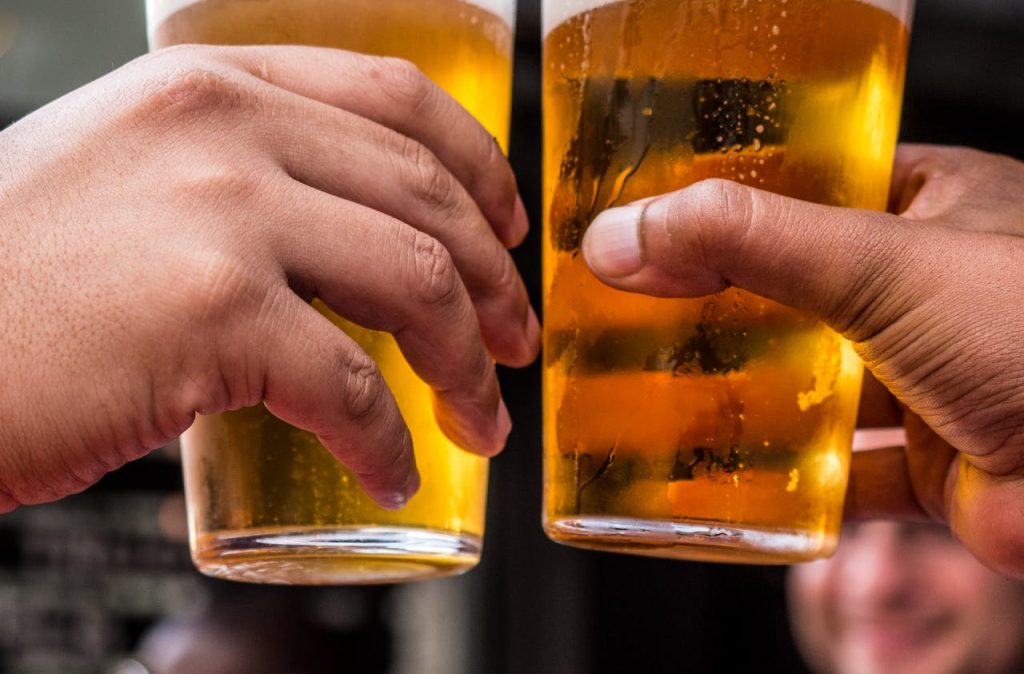Geschatte leestijd: 3 minuten
Alcohol intake affects your food intake. So that beer belly may not only be the result of beer itself.
Alcohol and Drunchies
Recently, we wrote about the ‘munchies’, the craving for food caused by marijuana use and its causes. However, a night of drinking can also lead to a craving for certain foods. It’s also called ‘the drunchies’; the craving for salty, fatty, unhealthy food during and after a night of drinking.
Researchers from the University of Michigan, University of Toledo, and Bowling Green State University wanted to know how students’ drinking behavior affects their diet.
Given the obesity epidemic and the rates of alcohol consumption on college campuses, we need to be aware of not only the negative effect of alcohol consumption, but also the impact it has on what people are eating while they are drinking.
Jessica Kruger, University at Buffalo’s School of Public Health and Health Professions
Kruger is the lead author of a recent publication that examines the relationship between heavy drinking episodes and food choices the following day [1]. A connection that, according to her, has received too little attention in studies on the effects of alcohol consumption and the causes of obesity. Given that 65% of American students drink regularly, it seems to be an important correlation. Kruger and her colleagues conducted their study using data from 286 students at a large university in the Midwest.
Morning after diet
The inspiration for the research came from an advertisement they and some colleagues read in the university newspaper. The title was: “Got Drunchies?” The advertisement contained offers for pizzas, tacos, and other fast food from restaurants that were still open after bars around the campus closed. They thought it was an interesting topic for research.
Their initial study examined what people eat while they drink. This second study looked at what was eaten the next day. Students were asked to complete an anonymous survey. This first asked general questions about their diet, such as: “What do you normally eat as your first meal of the day?” Or: “How often do you eat something before going to bed?”
Further into the survey, they were asked how often they ate (and what) before going to bed, after drinking alcohol. They were also asked what they often ate first the morning after a night of drinking.
Alcoholic snacks
Drinking caused students to eat differently before going to sleep. All alcohol drinkers ate more before going to bed than usual. Specifically, salty snacks and pizzas. The researchers believe this is because blood sugar levels fluctuate greatly after drinking. These fluctuations then lead to feelings of hunger.
Healthy foods that they normally ate before going to sleep were less appealing. Surprise….
The researchers were particularly concerned that students hardly drank non-alcoholic drinks before going to sleep. This exacerbates dehydration from alcohol and increases the likelihood of unhealthy food choices. The day after the drinking binge, the first meal was often skipped. Again, not very surprising.
The next day, preference was given to foods like pizza, tacos instead of dairy products and whole grains. Usually as so-called remedies for a hangover, such as food that would ‘soak up’ the alcohol. Debunking such myths spread among students could mitigate some of the consequences of drinking.
Campuses would do well to limit the nighttime snack offerings. Personally, I think the surveyed students would have preferred research into hangover remedies that actually work.
References
- Jessica Kruger, Jennifer Glassman, Kerri Lynn Knippen, Tavis Glassman, and Daniel J. Kruger. The Drunchies Hangover: Heavy Episodic Drinking and Dietary Choices while Drinking and on the Following Day. Californian Journal of Health Promotion, 2018

